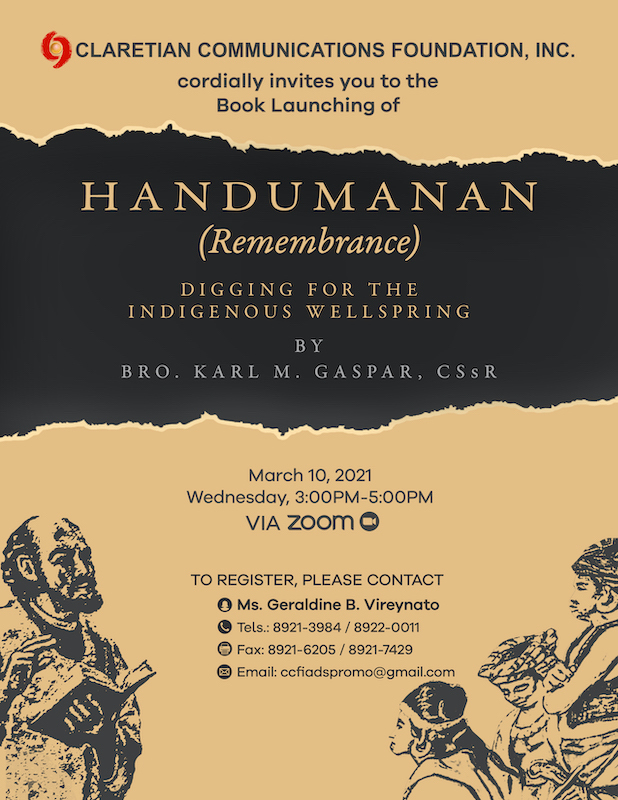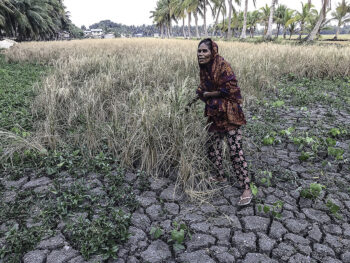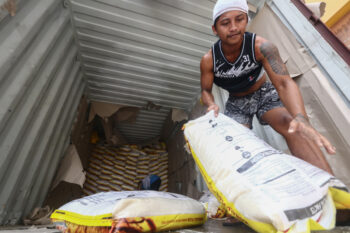Book: Handumanan (Remembrance): Digging For The Indigenous Wellspring
Author: Karl M. Gaspar, CSsR
Published by the Claretian Communications, Inc. and the Episcopal Commission
on Indigenous Peoples
Online book launch on March 10 at 3 p.m.
Register here: https://forms.gle/bPVUcEkN1mCiDUcj9
All over the world, a cultural reckoning is happening. In the US, confederacy flags, pro-slavery and white supremacist signs are being purged. In London, movements of brown and Black Lives Matter are swelling. And in Australia, the Aborigines voices are clamoring to be better heard.
With Handumanan, Brother Karl Gaspar’s latest book, the hope rises that in the Philippines, a shift towards a truly new world awaits the Indigenous People in the Philippines.
Begun while he was battling a deadly sepsis at a hospital in Davao City, Handumanan by Brother Karl is an ambitious review of our indigenous people’s lives, tracing its complex history from 1521 to 1898.
 Intuiting that his parents may themselves have descended from a line of Babaylans (beloved ancient healers and native leaders), Brother Karl seeks to look at the flow of events from the precious lens of the Lumads (IPs).
Intuiting that his parents may themselves have descended from a line of Babaylans (beloved ancient healers and native leaders), Brother Karl seeks to look at the flow of events from the precious lens of the Lumads (IPs).
The IPs are the focus of this year’s mission activities of the Catholic Church. The year 2021 also coincides with the 500th anniversary of the coming of Christianity to our shores.
But rather than wantonly celebrating, Handumanan — through its nuanced and detailed retelling of IP history — argues for a sober “commemoration” of the 500 years of Christianity, with serious reflection on the church’s successes and failures in its handling of apostolate.
Rich with scholarly accounts, Handumanan is divided into six parts — each one intricately weaving Light and Shadows in the act of “remembering” —- the trajectory of the colonizers’ early contacts, the Spanish colonization period, the responses and people’s resistance to colonization, the continuing realities of the IPs, and reflections on the church’s contemporary mission.
This book is a gift to any Filipino man or woman seeking to understand who we are (and how we became so utterly colonial). Thanks to endless days of quarantine, Karl miraculously gathered into one place all the relevant references from historians, biographers and Filipino social scientists, the better to grasp the past.
I enjoyed reading colorful details, such as how innocently our ancestors welcomed the first Spanish ship with drinks, how they never hoarded goods (not even gold) for they believe Nature provides for everyone, how they always cooked more than they needed because guests would be welcome, how the elders always sought harmony and peace, how they always spoke in diplomatic ways to avoid hurting feelings, how they fought corruption and promoted social justice. Wow, I thought, We were such a wonderful bunch before the colonizers came!
However, “Despite the wealth of literature, “ writes Karl, “most of us continue to patronize and pity them, to downplay the importance of indigenous knowledge. And worst of all, to be involved in the tragedy of their displacement…”
Moved to action by this work, we hope readers can help heal the wounds inflicted on the IPs and restore our pride in our ancestors’ ways of being. We hope we can appreciate and see them from loving brown eyes — not with warped white lenses.
(Marilen Abesamis is an educator, Zen meditator and energy medicine practitioner)







